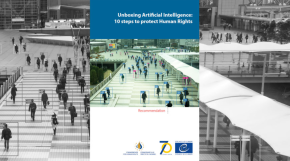The Commissioner for Human Rights of the Council of Europe (COE) has just released a Recommendation to CoE Member States on the impact of Artificial Intelligence (AI) on people’s lives and rights. The 10-point Recommendation provides guidance for national authorities and AI actors to maximise the potential of AI systems and prevent or mitigate the negative impact they may have on human rights and civic space. With a useful and user-friendly checklist of dos and don’ts included, these Recommendations are easy to understand and follow, to ensure that human rights are strengthened and not undermined by Artificial Intelligence. The Recommendation recognizes the importance to consider civic space issues in the development of AI systems; specifically:
- A specific section addresses freedom of assembly and association under the 10 key areas of action. It also refers to the impact of AI systems when exercising these freedoms online;
- It calls for external experts/reviewers to be included in the human rights impact assessment to ensure that potential negative consequences of any AI systems are fully understood and mitigated in a timely manner;
- It includes a separate principle on privacy/data protection to require that AI-driven processing of personal data abide by the relevant international human rights standards protecting people’s right to respect for private and family life as well as their right to know how their data is collected and used.,
- It highlights the importance of redress mechanisms to have effective remedies for any harm suffered by the development, deployment or use of AI systems.
ECNL engaged in the drafting process and welcomes the fact that our recommendations concerning civic space were all taken onboard and are well reflected in the document. We will continue engaging with European and UN institutions to ensure AI development and implementation is fully rooted in the existing universal, binding human rights and freedoms framework and encourage wider public participation in these debates.
Read the Recommendation here: Unboxing artificial intelligence: 10 steps to protect human rights
